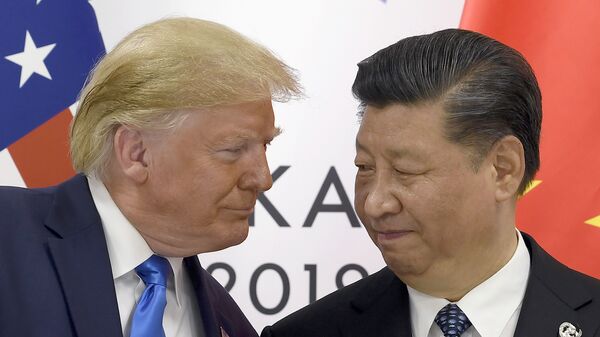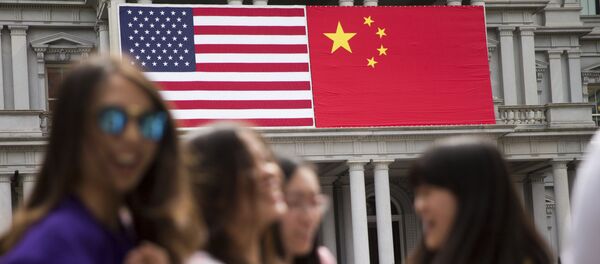US President Donald Trump earlier this week threatened that Washington could completely cut off diplomatic relations with Beiing over the coronavirus crisis.
The president's warnings followed increasingly bellicose statements by US officials in recent days threatening to sanction, sue, or impose tariffs on China over what they describe as the nation's mishandling of the COVID-19 crisis. Beijing has, in turn, warned that it will retaliate against any hostile US measures.
Analysts believe that by escalating tensions with China, Trump is pursuing his own election agenda, and trying to hamper the former's economic recovery in the wake of the pandemic.
Unprecedented Anti-China Campaign in the US
Republican Senator Marsha Blackburn wrote to her colleagues urging them not to meet with Chinese companies and to be careful when dealing with Chinese officials. She called to avoid them in the halls of Congress.
Last week, Republican senators drafted a bill that would allow President Donald Trump to sanction China if the country didn’t give a "full account" of its role in the coronavirus outbreak.
The lawmakers demanded that all the circumstances surrounding the outbreak be investigated within 60 days, as well as to confirm the closure of so-called "wet" markets in China and the release of activists arrested over the Hong Kong riots.
Otherwise, it has been proposed to freeze Chinese assets in the United States, introduce travel bans, tighten visa issuance, as well as restrict the access of Chinese companies to bank financing and capital markets in the United States.
The US "visa war" against China continued this week, limiting visa validity for US-based Chinese journalists to 90 days. The Xinhua News Agency called the decision a discriminatory act and unprecedented pressure on Chinese journalists. According to the agency's spokesman, this completely exposed the hypocrisy of the "freedom of the press" proclaimed by the United States.
Donald Trump's statement that the US could completely sever relations with China due to the pandemic was another attempt at unprecedented blackmail and pressure on China. Talking to Fox Business, he pointed out that he had good relations with the Chinese president, but he said didn't want to talk to him "at the moment".
That same day, Secretary of State Mike Pompeo called on forces allegedly tied to China to stop stealing coronavirus research data, shortly after the FBI and the US Department of Homeland Security had accused Beijing of the same thing. Pompeo called China's behavious in cyberspace "a continuation of its counterproductive actions against the coronavirus".
According to Zhou Rong from the People’s University of China, Trump is using pandemic-related accusations against China solely for political purposes, while his threats to sever relations with China are unfeasible.
"Trump uses accusations against China mainly for his own political purposes. In order to win the election, he can stigmatise China, make awkward accusations against the WHO, and have a conflict with Russia. I'm afraid this will continue in the future. As for Trump's intention to break ties with China, such a decision cannot be made by one person, given the huge Chinese market with a population of 1.4 billion people; many US businessmen won't agree with him. Moreover, if the US 'detaches' from China, it won't be able to find a comparable alternative market and therefore solve the problems of employment, imports and exports. China will stand firm and won't take US politicians' bait".
US Lost to China at Start of Crisis Recovery
The new front of the US-China pandemic-related confrontation unfolded at a time when China's ambitions and self-confidence are growing amid its advances in fighting the pandemic.
At the same time, the pandemic has shown that the United States is losing the chance to remain the global leader, as it's proclaimed itself. They have to rethink their position in the world after emerging from the pandemic. RISI expert Mikhail Belyaev said the US is already losing to China at the start of economic recovery after the health crisis:
"Recovery from the pandemic crisis is now emerging. Different countries are recovering at a different pace. China has already started recovering its economy quite successfully, while the Americans seem to be more and more mired in this crisis. They are making efforts to recover, but mainly in the field of financial manipulation. Even before the pandemic, the Americans lagged behind China in terms of development and had started losing to it in an increasing number of positions. And now there's the beginning after the crisis. The Chinese are winning at the start, and a gap at the start always means a lot for further competition. The Americans understand they are losing; therefore, having no opportunity to promote their economy, they are trying to at least politically restrain China. And, as usual, they don't mind using any means to do that".
One of their methods is to use the WHO to attack China, analysts believe. At first, under the pretext of allegedly insufficient WHO-China cooperation on the coronavirus issue, although in fact, Beijing worked closely and constructively with the global community in fighting the pandemic, and then by raising the "Taiwan card" at the WHO on the eve of the World Health Assembly scheduled for 18-19 May.
Yang Mian from China's Institute for Mass Communications believes the United States is trying to use the upcoming event to draw attention to China and divert attention away from its own difficult epidemiological situation:
“American medical experts and local authorities currently believe that the federal government's response to the epidemic is ineffective. The Trump administration does not want to take responsibility for its obvious blunders. Therefore, the US government's accusations against China are a distraction, a relatively simple way of disguising their guilt. Accusations against the WHO serve the same purpose. Under the pretext of dissatisfaction with the WHO, the United States wants to stop financing the organisation. The country will try to use the upcoming World Assembly to attack China and the WHO. This is why they stepped up preparations through various channels, as well as intensified means to prepare public opinion in order to divert attention away from the US government's inability to effectively respond to the epidemic".
US Afraid to Spar With China One-on-One
On the eve of the World Health Assembly, the US is actively engaging its allies and the international organisations it controls to create a broad international anti-Chinese front. Even NATO is involved here.
Speaking to the Italian paper La Repubblica, NATO Secretary-General Jens Stoltenberg claimed that China and Russia are spreading misinformation to increase their influence on political processes in NATO and the EU, as well as to destabilise the global situation amid the pandemic. The NATO Secretary-General, however, didn't cite any concrete examples of misinformation by China and Russia.
The member state of the Five Eyes intelligence organisation have also contributed to the anti-Chinese campaign. The organisation includes the US, Australia, New Zealand, the UK, and Canada. These nations have supported the US calls to investigate the WHO and China's role in fighting the pandemic; a number of them, despite vehement protest by Beijing, spoke in favour of inviting Taiwan to attend the World Health Assembly.
Canada's CBC reported, citing a senior Canadian government official, that at a meeting with senior WHO officials, the ambassadors of France, Germany, and Japan to UN organisations in Geneva, along with the ambassadors of Canada, Australia, New Zealand, the UK, and the United States supported inviting Taiwan to this international organisation.
Mikhail Belyaev believes that creating an anti-Chinese alliance is unlikely to help the United States restrain China and maintain the former world order:
"This is the signature style of American politics: to try and involve as many countries dependent on them in one way or another into the mainstream of its policy. It may be economic, political, or ideological dependence. In this confrontation with China, they are trying to maintain the world order they have created, which is now collapsing. They are trying to consolidate at least the remnants of this world around them, inflicting at least moral or reputational damage on their rival, China. China is quite firmly on its feet, and not only in the field of economics. China has already gained significant points in political competition with the US; it is clearly becoming the new global leader".
The US needs allies to maintain its reputation in the eyes of the global community, Yang Mian believes:
"Attracting allies is aimed at strengthening the US's processing of public opinion as well as creating the effect of mass support for their anti-Chinese campaign. Of course, the US will be happy if any other country takes the initiative. At the moment, the United States has the largest number of coronavirus cases and deaths; the country is facing the biggest problems. Therefore, it should start with itself, with solving its own problems, rather than searching for allies to confront China".
China Wants Cooperation Rather Than Confrontation
Beijing should seriously react to Washington's actions, as well as build a reasonable and restrained diplomatic policy that is in line with its interests, Zhou Rong noted:
"I believe that one shouldn't pay too much attention to US actions. Their compensation claims for damage allegedly caused by China or confiscating China's assets in the US are very difficult to implement. Moreover, the attitude of America's allies towards China is not identical to that of the United States towards China, they have their own position. China should respond more severely (to American attacks); at the same time, it should be rational and moderate, as well as consider its foreign policy interests. In addition, one should separate the American people from the US government, distinguish intellectuals from anti-Chinese groups in the US government, as well as understand that there are other officials and politicians besides Trump and Pompeo. Our goal is to develop good relations with the United States, to support rational and understanding people in the United States. Besides this, I'm afraid that if there is a second wave of the epidemic there will be many more cases in the US. Then Trump will definitely not be thinking about China, and even more so he won't be talking about ending relations with China".
According to observers, US attempts to throw China off balance in this psychological war of words and to provoke it to some harsh anti-American actions are not having the expected effect. The People's Bank of China has even issued a permit to Fitch Bohua, which is owned by Fitch Ratings, to conduct business in the Chinese market.
This was state on the Chinese Central Bank's website on 14 May . The company is allowed to evaluate certain bonds in China's interbank securities market. Fitch Ratings' admission to the Chinese market is part of the first-phase trade agreement between China and the United States.
As part of this agreement, the Chinese government will cancel additional import duties on the second shipment of goods from the United States on 19 May. The list includes 79 items.
Such contacts were made with the leaders of Spain and a number of other countries, the foreign ministers of Ethiopia and Mali, and the representatives of Caribbean and Pacific island states that maintain diplomatic relations with China. Beijing's partners spoke out against demonising it under the pretext of the pandemic, supporting the WHO's leadership role in the global fight against the pandemic, and assured adherence to the "one China" principle.





